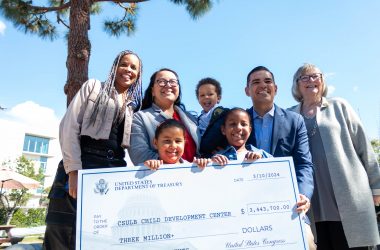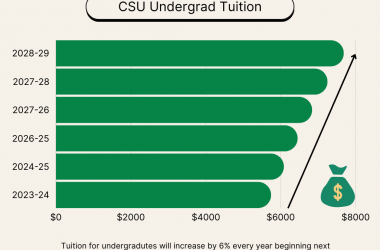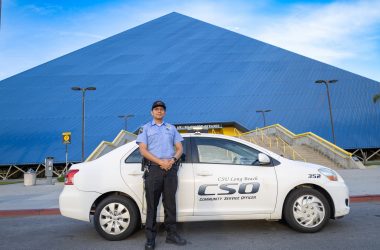Mexican President Enrique Pena Nieto recognized Cal State Long Beach seniors Ana Roman and Jaime Jorge for receiving the Institute of Mexicans Abroad scholarship in an event held in Los Angeles on Monday, Aug. 25 at the Biltmore Hotel.
Nieto was accompanied by Gov. Jerry Brown, L.A. Mayor Eric Garcetti, Mexico’s Ambassador Eduardo Medina Mora and 11 others from the Mexican government, Vasquez-Ramos said.
CSULB Professor Armando Vasquez-Ramos nominated both students for the scholarship, which would help pay for tuition, books and any other supplies.
“The primary reason [they were nominated] is because they are both excellent students that have been in my classes before,” said Vasquez-Ramos. “Most importantly they were both successful in my spring semester class that included the travel program in Mexico.”
Vasquez-Ramos added that Roman and Jorge are the first undocumented students who have left the United States to go back to Mexico and return.
“They were not only deserving from their academics, but they’re truly the pioneers to able to return to Mexico with illegal status and be able to return to the U.S.,” said Vasquez-Ramos.
“That’s why the Mexican console was so interested,” said Vasquez-Ramos. “They see the importance of the precedence we have established.”
A week before the event, Vasquez-Ramos called Roman and Jorge to tell them the news.
“I was in shock because I didn’t know that he had nominated me for a scholarship,” said Roman. “To me it was like a gift what he did for us.”
“I was really grateful I was nominated by Professor Armando,” said Jorge. “It’s thanks to him that we have this; it’s a really good feeling.”
The certificate they received acknowledged not only their academic achievements, but also their resilience being undocumented and carrying the stress of their families on their backs.
“A lot of people, sadly, give up along the way,” said Roman. “Being undocumented is not only about the economic hardship, but at one point in time, our parents are getting older. If they get sick, we can’t get medical insurance. If one of our parents are deported, now we’re in charge of our families. If we get deported, our parents are going to suffer.”
Attending the trip to Mexico gave the students an “intense and ambitious” experience, Vasquez-Ramos said. “They took classes, met students, and went to historical sites. They knew they had to overcome that barrier.”
Roman came to the United States from Mexico at nine years old with her mother, and stayed with her grandparents who came to the U.S. with VISA’s. She said that at that early stage in her life, she knew things wouldn’t be easy to come by.
“My mom made it very clear that I would have struggles with education or finding a job,” Roman said. “That was always very present in my mind, and that made me a little bit stronger because regardless of all these obstacles, I’m still going to college I don’t care what people say.”
Throughout high school, Roman said she had no problems academically, but the FAFSA workshops were no help to her situation of having no papers. With no one to guide her, Roman discovered how to get into college on her own.
In her senior year of high school, Roman applied for AB-540, which allowed her to pay in-state tuition at CSULB, despite the fact that she was undocumented, because she had attended high school in California for three or more years, had earned a high school diploma and had no criminal record.
After being accepted to CSULB for the first time, however, Roman didn’t have the money to pay for tuition and had to decline. She attended Long Beach City College for three years and got a minimum wage job, which helped pay for LBCC and allowed her to save money for CSULB. Roman transferred in 2011; she is a double major in psychology and Chicano and Latino Studies, and is minoring in Africana Studies.
Jorge was carried to the U.S. when he was 40-days-old and struggled financially; he said found ways to make money less of a burden. Immediately after high school, Jorge discovered AB-540.
“My parents were helping me out financially a little bit, or however they can,” said Jorge. “But it was always a struggle trying to find a way to pay my tuition, so I feel that this scholarship will help me out with books and class and stuff.”
Jorge said he was the first in his family to go to college, so his parents were not knowledgeable about furthering his education.
“All they know is they came here to give us, their kids, a better education and a better way of living instead of poverty and crime that’s always happening over there,” said Jorge. “The DREAM Act is really helpful for us to be able to continue our education.”
Jorge is majoring in Spanish with an emphasis in translation and interpretation.
As both seniors prepare to graduate in December, they already have plans for using their degree to help others in their situation.
Roman plans to apply for the joint JD/PhD program with her JD emphasizing on education or sociology.
“With the JD and PHD I plan on being a lawyer and a professor because I love to teach,” Roman said. “The JD would be emphasizing on critical race studies just to make the world a little better place regarding immigration and race issues and social issues.”
“I would want to be an interpreter in the medical field,” Jorge said. “In the hospitals and clinics, that’s going to really be needed for a couple years. Also be aware of what’s going on, learning other things, and just also letting other people know about it too. Getting them informed and helping out the community.”
As of right now, both students are involved in their communities already, helping students who share similar situations.
“After I got deferred action, I was able to apply to work at a high school,” Roman said. “I’m working tutoring English learners. I knew the struggle of learning a new language as a kid, and just being in a whole new culture, so I’m doing that right now, and aside from that, I’m forming a group of students to help tutor these students after school. That’s just been amazing for me and an amazing experience for the students that require that extra help.”
Jorge participates in a club called Future Underrepresented Educated Leaders (FUEL), which shows undocumented freshman and transfer students the resources they have on campus.
“Where to go for the DREAM Act, what advisor to talk to and counseling” are a few things FUEL can provide to incoming, undocumented students, Jorge said.
Professor Vasquez-Ramos said he would like to continue his study abroad program next Spring semester and lengthen the trip from 12 days to a couple of months.
“We conquered the obstacle, and it establishes the precedence for dreamers to dream to go back to wherever they came from,” said Vasquez-Ramos. “I really hope that this will open the door for hundreds and thousands of them [because] if they don’t know they wont even chance it.”




Interesting – maybe we can get the Mexican President to award scholarships to regular students since the state can’t afford to.